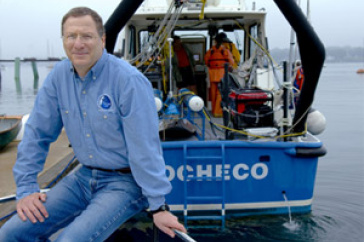UNH Oceanographer Tapped to Lead National Oil Spill Committee

Larry Mayer, University of New Hampshire professor of Earth science and ocean engineering, director of UNH's Center for Coastal and Ocean Mapping, and co-director of the UNH-NOAA Joint Hydrographic Center. Credit: Lisa Nugent, UNH Photographic Services
DURHAM, N.H. - A University of New Hampshire ocean mapping expert will lead the National Research Council's committee to study the effects of the Deepwater Horizon oil spill on ecosystem services in the Gulf of Mexico. Larry Mayer, professor of Earth science and ocean engineering, director of UNH's Center for Coastal and Ocean Mapping, and co-director of the UNH-NOAA Joint Hydrographic Center, will chair the committee in a 30-month inquiry that will produce a final report for elected officials, public policy leaders, and the public in fall of 2012.
The 16-member committee is charged with evaluating the loss of ecosystem services in the Gulf of Mexico Large Marine Ecosystem due to the Deepwater Horizon spill.
"The committee is looking at approaches to evaluating the impact of the spill on ecosystem services," says Mayer, who returned from the first committee meeting last week. "What techniques are available to quantify the impact of the spill on food from the Gulf, how do you determine the impact on water purification, or recreation or cultural significance?"
An interim report, anticipated for summer of 2011, and the final report will provide a framework to assist federal agencies and others in assessing the effects of the oil spill on ecosystem services within the context of other human activities. Under the auspices of the National Academy of Sciences, the National Research Council is an independent, unbiased institution that aims to provide elected leaders, policy makers, and the public with expert advice based on sound scientific evidence.
Mayer, whose primary research concerns ocean mapping and sonar imaging, worked in the Gulf of Mexico on the NOAA ship Thomas Jefferson after the spill. But he stresses that as the chair, he relies on the individual expertise of committee members.
The National Oceanic and Atmospheric Administration's (NOAA) National Marine Fisheries Service is the primary sponsor of this committee. For more information about this committee and its charge, go to http://www8.nationalacademies.org/cp/projectview.aspx?key=49311. More information about Larry Mayer is available here http://www.ccom-jhc.unh.edu/people/index.php?q=mayer and here http://www.unh.edu/facultyexcellence/2007/uwide.cfm?image=mayer.
The University of New Hampshire, founded in 1866, is a world-class public research university with the feel of a New England liberal arts college. A land, sea, and space-grant university, UNH is the state's flagship public institution, enrolling 12,200 undergraduate and 2,300 graduate students.
-30-
Photograph available to download: /unhtoday/news/cj_nr/2011/jan/bp31mayer.jpg
Caption: Larry Mayer, University of New Hampshire professor of Earth science and ocean engineering, director of UNH's Center for Coastal and Ocean Mapping, and co-director of the UNH-NOAA Joint Hydrographic Center.
Credit: Lisa Nugent, UNH Photographic Services
Reporters and editors: Larry Mayer can be reached at 603-862-2615 or mailto:larry.mayer@unh.edu"
-
Media Contact
National Science Foundation | National Science Foundation | dwing@nsf.gov | 703-292-5344
Latest News
-
July 2, 2024
-
June 18, 2024
-
June 18, 2024
-
May 17, 2024
-
May 14, 2024

















































